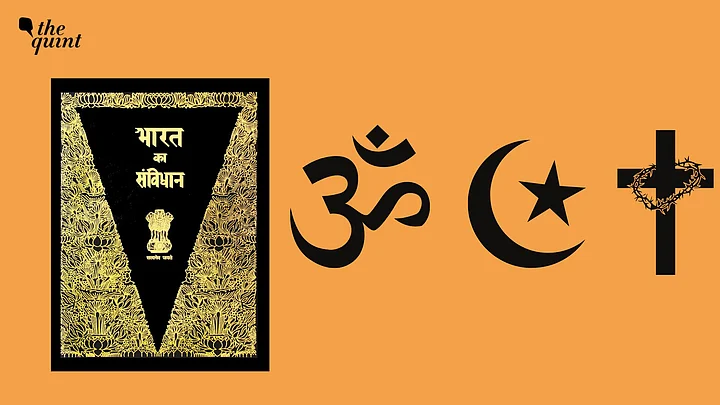The Gujarat government recently defended its requirement of the district magistrate's consent, prior to religious conversion, saying that it is in order to:
“maintain public order within the State of Gujarat by protecting the cherished rights of vulnerable sections of the society, including women and economically and socially backward classes.”
The reported intent behind this procedure is to find out whether any force or undue influence has been exercised in matters of conversion. Prior to this, the states of Madhya Pradesh and Odisha had also passed similar legislations.
However, a legislation prescribing consent of the District Magistrate (DM) before conversion from one religion to another makes little sense, and is blatantly anti-constitutional.
Here's Why:
First of all, such legislations contradict the intention of the Constitution. Under, Article 25(1) of the Constitution, all persons, subject to public order, morality and health and to the other provisions of this Part, are equally entitled to freedom of conscience and the right to freely profess, practice and propagate religion.
These fundamental rights will become meaningless if one has to seek a District Magistrate's consent.
Further, the term “religion” is not defined in the Constitution. It also defies precise judicial definition. Religion is a matter of faith. It cannot be left to the vagaries of judicial determination to decide as to what is religion, and a judgment cannot act as substitute for statutory definition. A judicial definition is only explanatory and not definitive.
Why Grounds of 'Morality', 'Health' & 'Public Order' Don't Work
The terms “morality” and “health” (which are where such legislations draw their power from) are vague and differ from time to time and place to place.
If the intention is to make a law against the so called "forced conversions" and to stop them by mandating prior consent of the District Magistrate, even the term “public order” does not carry much legal import. This is because, in defining general public order, the Supreme Court has already held that it should relate to immediate circumstances and not be based on hypothetical considerations.
If quitting one religion and joining another religion due to force is to be curtailed by prior consent, then it should apply equally to a person quitting a religion and turning irreligious or becoming an atheist. These are all abstract notions circulated by right-wing groups, with little basis on reality.
Dr Ambedkar's Defence of Conversion
There is also no precise definition as to who is Hindu, especially when there are so many sub-divisions and religious denominations.
The stated idea to protect vulnerable sections of society including women and economically and socially backward classes is only a cliché.
When Mahatma Gandhi referred to missionaries distributing incentives for conversion as being wrong, Dr BR Ambedkar told him that if the Hindu religion does not recognise the scheduled castes, why should they be concerned about the Dalits taking on a new religion, and even accepting incentives in the form of education and health care.
That was why Dr.Ambedkar said: "Even though I was born in the Hindu religion, I will not die in the Hindu religion."
If this new law was applied retrospectively, even Dr Ambedkar and the 2.5 lakhs Mahars who embraced Buddhism at the Diksha Bhoomi in Nagpur could also be punished.
Women & Members of Socially Backward Classes Deserve Better
It is not as if women or members of economically and socially backward classes are so vulnerable that they require state supervision while accepting a new religion. On the other hand, many of them have adorned high offices of this country.
The state cannot make every decision on behalf its citizens. Citizens have autonomy over their decisions and a person on attaining majority can renounce his faith in one religion and accept another. To assume a woman or a person belonging to an economically or socially backward class as gullible and thereby, to question their ability to decide for themselves is to act in a paternalistic manner.
And this paternalistic attitude should be condemned.
Such legislations strip the citizens of their agency, under the garb of checking religious conversion. Further, they pave way for communal politics and an agenda-driven discourse.
They also place additional burden on the District Magistrates, who are already inundated with responsibilities, and subject them to greater political pressure.
After the “Ghar Wapsi” program of the RSS and other affiliated groups failed, this is yet another attempt to keep the pack within the so-called Hindu fold, lest there may be an exodus due to the pernicious caste system or other such reasons.
(Justice K Chandru is a former judge of the Madras High Court. This is an opinion piece and the views expressed are the author's own. The Quint neither endorses them nor is responsible for them.)
